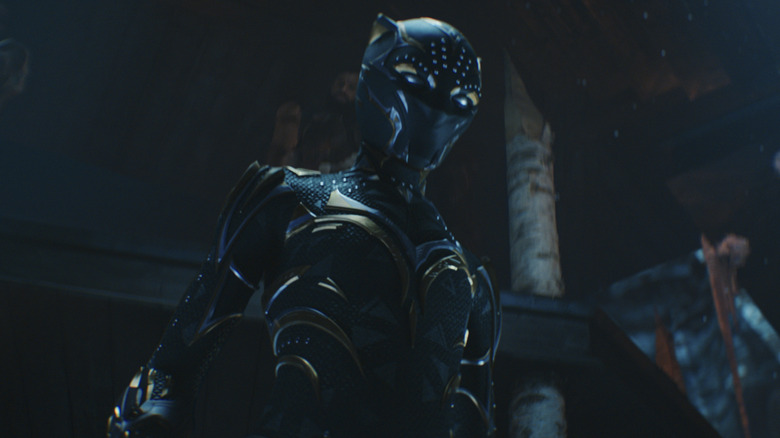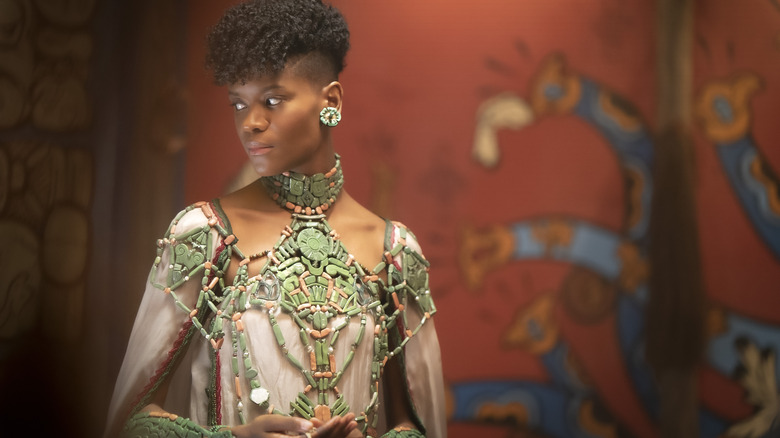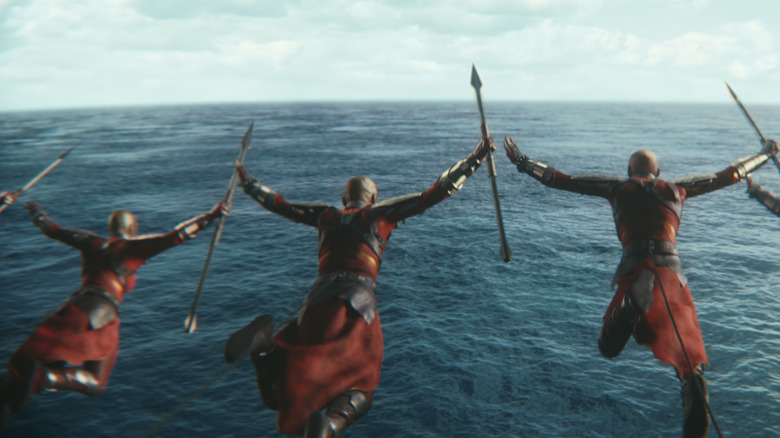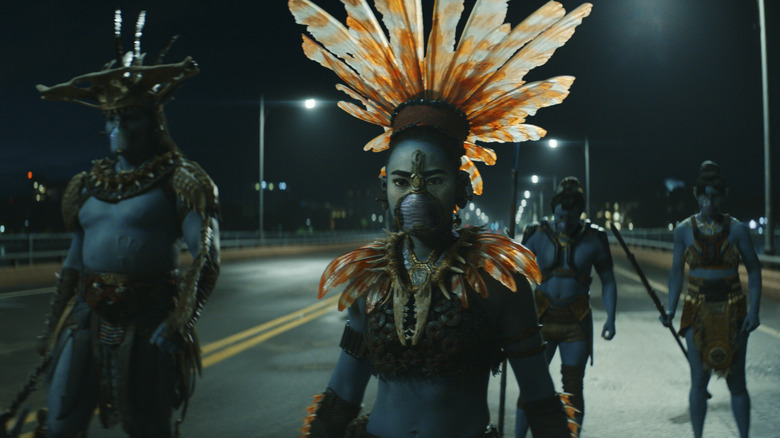Black Panther: Wakanda Forever Continues One Unfortunate Marvel Cinematic Universe Trend
After years of criticism in some corners that the Marvel Cinematic Universe had fallen into a stale pattern of formula and familiarity, Phase Four of the Marvel Cinematic Universe has felt like the most experimental the superhero studio has ever been. Naturally, this has led to some of the most divisive reactions that these crowd-pleasing blockbusters have ever received. For every well-received breakthrough character to arrive on the scene, from Simu Liu's Shang-Chi to the entire stable of "Eternals" to streaming service additions like Iman Vellani's Kamala Khan and Tatiana Maslany's Jennifer Walters, it seems as if their respective movies and shows themselves haven't experienced the same near-universal adoration that previous MCU entries have enjoyed.
That appears to have course-corrected in a big way with "Black Panther: Wakanda Forever," the highly-anticipated sequel to the 2018 smash-hit. (Check out /Film's review by Chris Evangelista for more in-depth thoughts.) Burdened with the sobering responsibility of paying homage to the late Chadwick Boseman, which has left a Wakandan-sized hole at the heart of this franchise, director Ryan Coogler's follow-up seems to have all in agreement that Boseman's passing and the legacy of T'Challa were handled as well as they possibly could be under the circumstances. Combined with the introduction of Tenoch Huerta Mejía's Namor, the buzz surrounding Angela Bassett's performance, and one of the most emotional mid-credits scenes in the MCU, "Wakanda Forever" should feel like a surefire success story.
And yet, all that said, I came away from this "Black Panther" sequel convinced that it only reinforces the issues prevalent throughout Phase Four. For all that it does well, "Wakanda Forever" falls back on perhaps the most disappointing and overdone MCU habit of them all: the fact that death doesn't matter.
Warning: Major spoilers for "Black Panther: Wakanda Forever" follow.
War, what is it good for?
"Wakanda Forever" is primarily concerned about the legacy that we choose to leave behind. Reeling from the death of T'Challa from an undisclosed illness that he kept private, which mirrors that of the character's real-life counterpart (at one point in the film, Shuri even notes that T'Challa "suffered in silence"), all of Wakanda faces an identity crisis. The isolated, vibranium-rich country struggles over the role of the unfilled Black Panther mantle, their tenuous position amid a surface world full of envious sharks smelling blood in the water, and the pressing question of how to deal with the threat of Namor and his Talokan people. All of these storylines represent scars that could linger for generations to come ... but none more so than the idea of all-out war with the previously-unknown underwater realm.
Throughout the film, the dire consequences of entering into a conflict with Namor hang heavy over the grieving Shuri (Letitia Wright) and Queen Ramonda (Angela Bassett). Coogler and Joe Robert Cole's script repeatedly emphasizes everything that stands to be lost in such a senseless struggle — every innocent life on both sides, the shared trauma from colonialism that makes them more alike than different, and especially the preservation of both kingdoms' customs, beliefs, and respective ways of life. In fact, the film goes so far as to spend some of its unwieldy runtime on quiet moments of Shuri mourning the loss of a single life, like the Talokan guard killed when Nakia (Lupita N'yongo) rescues Shuri and Riri Williams (Dominique Thorne) from captivity.
And yet, when the film builds to the tragic outbreak of battle between Wakanda and Talokan, the decision to boil it all down to Namor and Shuri's vendetta, while understandable, feels misguided.
Mixed messages
The MCU (along with superhero media as a whole, to be fair) has always struggled with committing to its most interesting concepts in favor of upholding the status quo. Remember when "Captain America: Civil War" made a big stink about superhero oversight and the Sokovia Accords? Not only did the movie itself kind of forget about that pesky little topic by the end, but so has every other MCU installment since. References to Thanos and his universe-wide genocide have been neatly brushed aside and relegated to minor references to "The Blip" (or, worse, relegated to cutesy in-universe jokes that seem horrifically tone-deaf) as life goes on as it did before. In the grand scheme of the franchise, a skirmish between the Wakandan and Talokan superpowers might not seem so pressing, but "Black Panther: Wakanda Forever" treats it as the film's core dramatic and thematic underpinning ... until it doesn't.
Once the slow-motion procession towards war reaches its inevitable conclusion in the third act, viewers are faced with a moral conundrum the likes of which Marvel has rarely offered.
Having established Namor and the plight of his people as wholly sympathetic (if somewhat murder-happy), the script asks us to feel conflicted emotions when Shuri recklessly ushers Wakanda into an escalation of war in the Atlantic Ocean. But paradoxically, the action is constantly framed in terms of how cool this set piece is. Isn't it cool how the Dora Milaje suit up in flashy new suits? Don't you get a rush out of seeing young Riri suit up and wade into the fray as an Iron Man-lite killing machine? Look at Shuri kick ass in her new suit! (Boy, this movie relies on a lot of new suits, huh?)
All the while, casualties mount until the conclusion hand-waves it all away.
Does death really matter ... or only certain deaths?
The popular criticism that death never matters in the MCU is only somewhat of a misnomer. Despite all the attention paid to the trend of tension-deflating resurrections and fake-outs, characters die and stay dead all the time; sometimes, even in droves! The bigger issue is who gets afforded the luxury of having their deaths mean something substantial, and who doesn't.
In "Wakanda Forever," the script only has room to properly mourn its major characters, treating everyone else as cannon fodder despite making half-hearted gestures otherwise. When T'Challa's passing, Queen Ramonda's heroic death, and the vision of Michael B. Jordan's Killmonger all motivate Shuri to unleash vengeance upon Namor, the climactic battle splits our attention between the two armies duking it out in one location and Shuri and Namor each attempting to kill the other in single combat.
Narratively speaking, even this feels like a contradiction. The urgency of the one-on-one brawl comes from the fact that both Wakandan and Talokan lives continue to be lost elsewhere at alarming rates. But when Shuri and Namor finally reach an understanding, the cop-out choice to have the two main characters order an end to the fighting allows both armies to simply stand down and go home without any more fuss, as if nothing ever happened. Even more egregiously, the movie frames Shuri's decision to spare Namor's life as what ultimately wins the day ... never mind all the other nameless Talokans that the Wakandans snuffed out throughout the movie (and vice versa).
The jarringly rushed segue into the ending puts a neat-and-tidy bow on what had been a complex and nuanced conflict. By holding back at precisely the worst moment, "Wakanda Forever" doesn't overcome the MCU's most pervasive shortcoming. It gives in without a fight.



